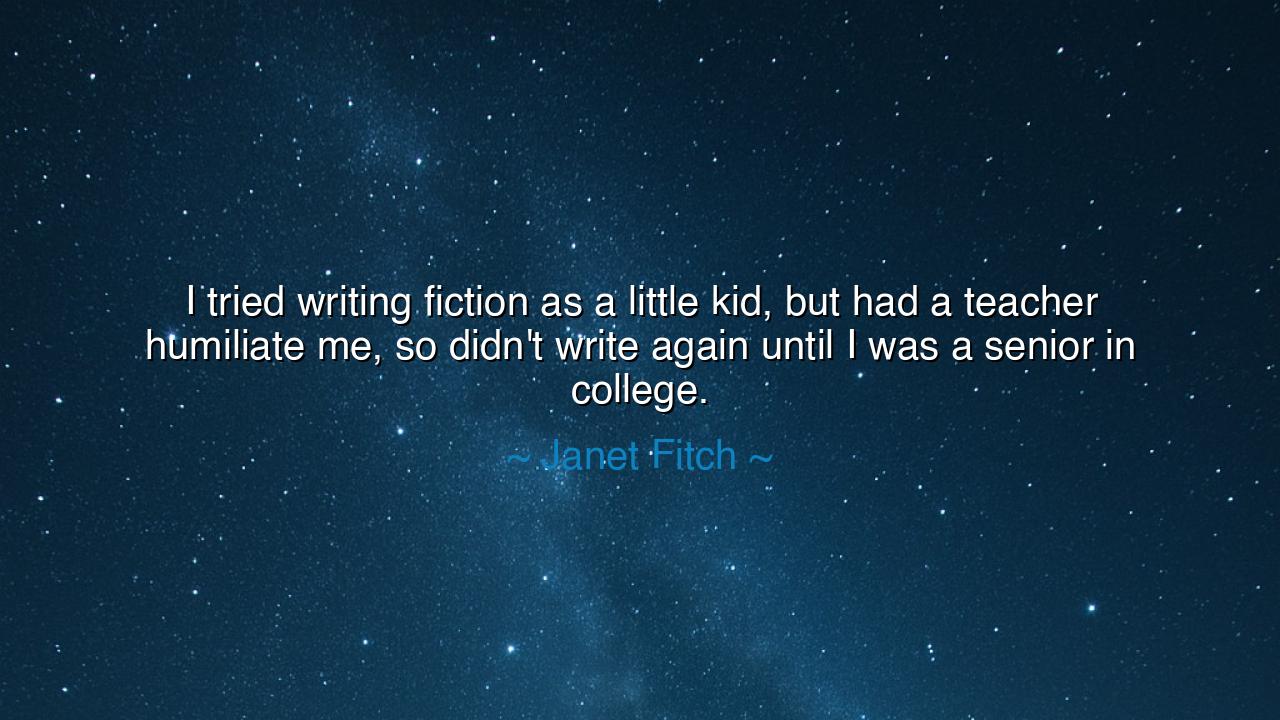
I tried writing fiction as a little kid, but had a teacher
I tried writing fiction as a little kid, but had a teacher humiliate me, so didn't write again until I was a senior in college.






Janet Fitch, in her remembrance, offers a testimony that is both sorrowful and triumphant: “I tried writing fiction as a little kid, but had a teacher humiliate me, so didn’t write again until I was a senior in college.” These words reveal the fragile nature of creativity, how it can be silenced by cruelty, and yet also how it can be resurrected with time and courage. Within her experience lies the universal struggle between the innocent flame of inspiration and the cold winds of discouragement.
The origin of this truth lies in the power of teachers and mentors. In childhood, a word of encouragement can ignite a lifelong passion, while a word of scorn can bury it beneath years of silence. Fitch’s teacher, perhaps without realizing the weight of their actions, became a stumbling block instead of a guide. Thus, the young Janet abandoned her craft, not for lack of talent, but because humiliation wounded the tender roots of her imagination. Only in her college years, with maturity and renewed strength, did she return to the path that was always hers to walk.
History is filled with similar tales. Thomas Edison was once dismissed by a schoolteacher as “addled” and unteachable. His mother, refusing to let that judgment define him, nurtured his curiosity, and he went on to illuminate the world with invention. Likewise, the painter Henri Rousseau was mocked as a naïve amateur by critics of his day, yet he persisted, and his work would later be hailed as visionary. These stories mirror Fitch’s, reminding us that genius is often delayed, not because it lacks substance, but because it is crushed under the weight of others’ doubts.
The emotional weight of Fitch’s words lies in the silence she endured. Imagine a child brimming with stories, silenced for years by one cruel moment. This is the tragedy of discouragement—it does not simply bruise; it paralyzes. And yet, there is also triumph in her eventual return. When she picked up her pen again as a senior in college, she reclaimed her voice. Her novels, known for their power and beauty, are the living proof that creativity may be delayed but not destroyed. The ember that sleeps may yet become a flame again.
The lesson for us is twofold. First, guard your words, especially with the young. A careless insult can sever a destiny; an act of encouragement can shape a future. Teachers, parents, mentors—yours is the sacred duty to nurture, not to humiliate. Second, for those who have been silenced: know that your gift waits patiently for you. Even if you abandoned it long ago, it has not abandoned you. Return to it with courage, and you may yet find it blooming stronger than before.
Practically, this means cultivating both resilience and kindness. If you are a creator and have suffered rejection or humiliation, do not let that voice define you. Find spaces that encourage, communities that uplift, and keep practicing your art until it becomes natural again. If you are one who guides others, speak with care. Offer correction, yes, but never with cruelty. Remember that the soil of creativity is tender and must be watered with patience and hope.
Thus, Fitch’s words are both a warning and an inspiration. They warn us of the destructive power of humiliation, but they also inspire us with the truth that it is never too late to return to what we love. Creativity may slumber, but it cannot die if it is truly part of the soul. Carry this teaching with you: be gentle with the dreams of others, and courageous with your own. For even after years of silence, the story that was meant to be written can still find its voice.






AAdministratorAdministrator
Welcome, honored guests. Please leave a comment, we will respond soon